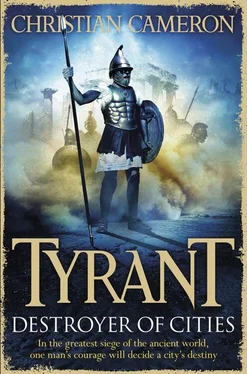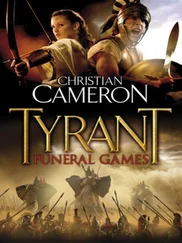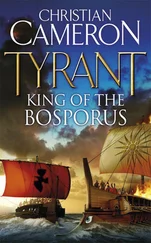Christian Cameron - Destroyer of Cities
Здесь есть возможность читать онлайн «Christian Cameron - Destroyer of Cities» весь текст электронной книги совершенно бесплатно (целиком полную версию без сокращений). В некоторых случаях можно слушать аудио, скачать через торрент в формате fb2 и присутствует краткое содержание. Год выпуска: 0101, Издательство: Orion Books, Жанр: Исторические приключения, на английском языке. Описание произведения, (предисловие) а так же отзывы посетителей доступны на портале библиотеки ЛибКат.
- Название:Destroyer of Cities
- Автор:
- Издательство:Orion Books
- Жанр:
- Год:0101
- ISBN:нет данных
- Рейтинг книги:5 / 5. Голосов: 1
-
Избранное:Добавить в избранное
- Отзывы:
-
Ваша оценка:
- 100
- 1
- 2
- 3
- 4
- 5
Destroyer of Cities: краткое содержание, описание и аннотация
Предлагаем к чтению аннотацию, описание, краткое содержание или предисловие (зависит от того, что написал сам автор книги «Destroyer of Cities»). Если вы не нашли необходимую информацию о книге — напишите в комментариях, мы постараемся отыскать её.
Destroyer of Cities — читать онлайн бесплатно полную книгу (весь текст) целиком
Ниже представлен текст книги, разбитый по страницам. Система сохранения места последней прочитанной страницы, позволяет с удобством читать онлайн бесплатно книгу «Destroyer of Cities», без необходимости каждый раз заново искать на чём Вы остановились. Поставьте закладку, и сможете в любой момент перейти на страницу, на которой закончили чтение.
Интервал:
Закладка:
He blinked.
Demetrios chuckled in victory.
‘I wish to crave a boon,’ Stratokles said.
Demetrios pursed his lips and nodded. ‘Within reason, anything.’
Stratokles scratched his beard. ‘I want to arm a trireme and look into their harbour. I think they’ve shifted their engines — all of them — to the south wall. You need a good captain, and a crew he trusts.’
Plistias looked at Stratokles with a new respect. ‘You would do this?’
Demetrios laughed. ‘Plistias thinks you are a coward who abandoned the third wall. I am not such a fool. I ought to reward you for saving so many — old Cleitas was senile. Lost in the glories of the past. You seek to prove yourself to me?’
Stratokles smiled. ‘Yes. You will see exactly who I am.’
Demetrios nodded. ‘Choose any ship you like.’
Dawn, of the siege’s one hundred and ninety-third day. Autumn, a cold, hard sky with high clouds that threatened a heavy wind, a red morning that might force sailors to take shelter.
A single black hull slipped off the beach and crept down the shore in the first light, oars muffled. Demetrios strode past the building area, where fifty new engines and a massive framework were under construction. Behind him, framing his head, a wooden wheel the size of an elephant towered, shot in iron. A hundred blacksmiths were already awake, pounding out plates. Demetrios smiled at the work.
‘When they see you,’ he said to the air, ‘they will know my power.’
Plistias, and the two mathematicians who had done the calculations on the new machines, followed him across the sand. ‘When they see it,’ said Ctesibius, greatly daring, ‘they will surrender.’
Demetrios was watching the black ship moving down the beach. ‘I don’t want them to surrender,’ he said. ‘Troy did not surrender. I want them to die.’
The ship began to gather speed.
‘Send a boy for the lovely Amastris of Heraklea,’ Demetrios said. ‘She will want to watch her hideous champion in action.’
‘He can certainly handle a ship,’ Plistias said.
A slave went running across the sand.
‘How tall will it be?’ Demetrios asked, looking at the scantlings — great oak beams from Epiros.
‘Taller than the pyramid of Chios,’ Ctesibius said.
Demetrios beamed. ‘I like that.’ He listened to the sound of a hundred hammers falling on a hundred anvils. ‘I like that.’
The slave returned and spoke to a staff officer, who spoke to Phillip the Macedonian, who looked around wildly.
‘Well?’ Demetrios asked. He had an eye for weakness.
‘My lord, Amastris is not in her tent. Nor are her maids.’ Phillip took a breath. ‘And her soldiers are not in their tents.’
Stratokles’ black-hulled ship raced along the mole and turned like the great drum of a war machine, as if guided by cogs and pulleys, into the harbour.
He ran down the mole — and the bolts began to fly. Not many, but enough to resound like huge hammers against a great drum when a brace of them hit his ship.
He turned again, his port-side rowers pulling their oars aboard just as his port side scraped along the hulks moored to cover the sea wall. Many of them had been burned, but the inner harbour had ships intact — and now they were covering his movement across the harbour.
The Rhodians hadn’t had time to heat any bolts, and many of their engines must have been moved — but Stratokles’ ship was hit, and hit hard. It shuddered, slowed and was hit again but the rowers kept their wits, and now Stratokles turned for the harbour opening.
‘Well done,’ Plistias said grudgingly.
The black ship shot out of the harbour entrance.
Stratokles was white-faced in the stern, his hands on the oars, a jagged splinter of white oak all the way through his left thigh so that his blood poured and pooled under him on the deck. There were men lying dead all along the deck, and more dead below in the oar decks, where the bolts had punched right through the fragile timbers.
But the ship was intact, and he was fifteen minutes’ row upwind of Demetrios’ fleet, and most of his deck crew were still alive. Amastris, brave as a lion, had refused to go below, and now she had a splinter right through her left hand, despite which she stood laconic, awaiting events, the blood running down her chiton while her maids screamed.
‘Shut them up,’ Stratokles said curtly.
‘Pull it!’ she said to her red-haired maid.
The Keltoi woman wasn’t screaming. She pulled the splinter out in one smooth movement. Amastris shrieked once, fell to the deck and then put her back to the mainmast.
‘Foresail,’ Stratokles called down the deck, and Lucius passed the order to the acting sailing master. The sail was brailed on its yard — two men cut the brails and it swung free and the wind caught it immediately.
A maid screamed. Amastris cuffed her. ‘Shut up, all of you. You,’ she said to the Keltoi girl.
‘Yes, Despoina,’ she said.
‘You are free,’ Amastris said. ‘You are too brave to be a slave. And you never heat my milk properly, anyway.’
One last shot came from the defences — a long shot, a light bolt that skipped on the wave tops and passed the ship as he heeled with the wind, pressing down the bow.
Rhodes was falling away under the stern.
‘We are all free,’ Stratokles said. ‘Goodbye, Golden King.’
Amastris kissed him. Lucius slapped his back. ‘Pretty smooth,’ he said. ‘Now lie down and let me save your leg.’
Stratokles was suddenly aware of great pain, and a rushing noise in his ears-
And he was gone.
30
DAY ONE HUNDRED AND NINETY AND FOLLOWING
The sag in morale when it became clear that Demetrios had no intention of abandoning the siege was so great that Satyrus thought the city might fall to any determined assault.
The weather grew colder, and it was too late to expect relief from the sea — and starvation began to stalk the garrison. There was no more oil to be found; wine was a drachma a sip, and the grain ration was cut — three-quarters of a measure, and then half, for all citizens.
Two weeks after the battle at the third wall, women cursed him in the street.
Miriam lost weight. He could see it in her neck and then, after a month on half-rations, he could see it in her face.
His sister lost weight. Anaxagoras lost weight. Men who survived the fever — like Abraham, gods be praised — had no meat to replace the muscle they lost, and they hobbled about like incarnations of Death.
The beautiful Nike died of fever, and Charmides was inconsolable.
And yet, unaccountably, after the lone ship tried to raid the harbour, the enemy didn’t stir. Demetrios sat tight behind his earthworks. The ring of hammer on anvil carried clearly, though, and the sound was more ominous than any war hymn.
Lysander the Spartan was a useful and professional addition. He kept tablets, counted things, men, arrows — and stones. Satyrus took him at face value for the sake of Philokles. He couldn’t imagine a dishonest Spartan.
Even the marines began to grow thin. Satyrus didn’t see it happen — he just noticed, all of a sudden one morning, that Apollodorus’ armour hung from him like a stripling wearing his father’s corselet, and that Anaxagoras was thin: Charmides, practising with a bated spear against the Spartan, had thin legs.
‘We’re starving,’ he said aloud.
Korus shook his head. ‘Nah,’ he said. ‘We’re a long way from starving.’ He shrugged. ‘But we’ll be weaker, and then weaker still.’
Satyrus took to walking the streets constantly — from fire to fire, from guard post to guard post. Miriam was often with him, or Aspasia, Anaxagoras with a lyre, Lysander with a wax tablet, Jubal with papyrus and a plumb line or a tambourine. The first time he carried a tambourine, Satyrus teased him that he was trying to ape Anaxagoras. ‘Or perhaps you will accompany him,’ Satyrus said.
Читать дальшеИнтервал:
Закладка:
Похожие книги на «Destroyer of Cities»
Представляем Вашему вниманию похожие книги на «Destroyer of Cities» списком для выбора. Мы отобрали схожую по названию и смыслу литературу в надежде предоставить читателям больше вариантов отыскать новые, интересные, ещё непрочитанные произведения.
Обсуждение, отзывы о книге «Destroyer of Cities» и просто собственные мнения читателей. Оставьте ваши комментарии, напишите, что Вы думаете о произведении, его смысле или главных героях. Укажите что конкретно понравилось, а что нет, и почему Вы так считаете.












